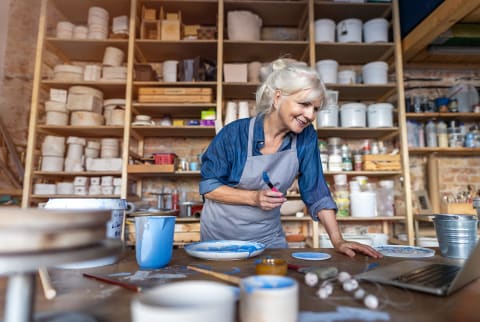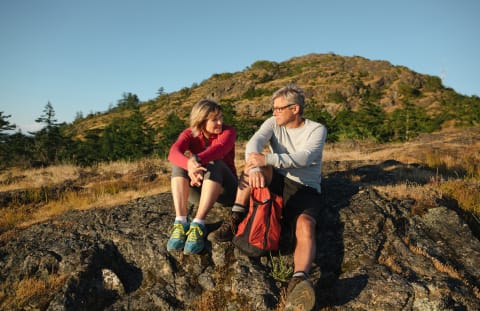Advertisement
Are You At Risk For Osteoporosis? Here Are The Facts

We've heard about the importance of growing strong and healthy bones since we were kids. But bone health is about far more than a cold glass of milk. Our bones are very much alive: constantly breaking down and growing anew to help support us, keep us moving, and protect organs like our brain and heart. Just like any living and growing thing, our bones need attention and care to stay healthy.
What is osteoporosis?
Prioritizing bone health is all about keeping the risk of osteoporosis at bay. According to the National Osteoporosis Foundation, "osteoporosis is a bone disease that occurs when the body loses too much bone, makes too little bone, or both." Under a microscope, a healthy bone has holes and spaces (think honeycomb). But with osteoporosis, those spaces are much larger, resulting in a loss of density and mass… Not-so-fun fact: Osteoporosis actually means "porous bone."
It's more common than you think...especially for women.
About 10 million Americans have osteoporosis, and 80% of them are women. Another way of looking at it: One in two women over 50 (compared to one in four men) will break a bone because of osteoporosis. Osteoporosis is very common, especially for the wider community, but thankfully there is a lot we can do to proactively keep our bones healthy. From eating a well-balanced diet to engaging in regular exercise, we can cultivate a lifestyle that's friendly for bone health and seek extra support from scientifically formulated bone health supplements like OsteoMD® by 1MD. It's never too early or late to take care of your bones.*

So, are you at risk for osteoporosis?
When we talk about the risk of osteoporosis, we're referring to your chances of getting osteoporosis in your lifetime. Some risk factors we can control, like diet. Not getting enough calcium and vitamin D can increase our risk of osteoporosis. Same with not exercising enough—our bones grow and stay strong with regular movement. Other controllable factors like drinking alcohol and smoking cigarettes (which keeps our body from utilizing its calcium) also increase our risk.
But then there are other uncontrollable factors that play into our susceptibility to osteoporosis—namely, age. Our likelihood of getting osteoporosis increases with age, and again, especially if you're a woman. Women are more prone to osteoporosis because they naturally have lighter and smaller bones than men. Plus, when women reach menopause, their estrogen levels decrease. Because estrogen is a hormone that helps protect bone in a woman's body, this often results in bone loss.
How to keep your bones healthy.
The good news is: You can make moves to help your bones stay healthy right now. And that simply starts with a closer look at your diet. Are you getting enough calcium and vitamin D? Pairing a balanced diet with physical exercise is really a cure-all when it comes to wellness, but especially for bone health. Make sure that your exercise of choice is strength-building and weight-bearing, like lifting weights or even walking.
Alongside these basics, taking a bone health supplement can make all the difference. OsteoMD® is a physician-formulated bone health supplement created specifically to address the growing bone health epidemic (affecting millions of American women). This clinically studied supplement combines four essential nutrients that help build and maintain strong bones, including Calzbone® and MenaQ7®—natural ingredients clinically proven to support bone health.* This supplement also provides vitamin D3, which helps store the body's natural calcium deposits on the bone matrix.* These fundamental ingredients are the bare bones of skeletal strength.*
Adam Kreitenberg, M.D., the doctor who formulated OsteoMD®, shares the comprehensive mission of this supplement: "to help people live longer, healthier lives through the powerful integration of advanced science and nature."

Avoid the symptoms of osteoporosis.
Bone health is tricky because we can't exactly feel our bones getting weaker or losing mass. In its early stages, osteoporosis can usually only be detected by bone density tests. In later stages, osteoporosis can cause weight loss, chronic pain, bone breaks, and can affect our height and posture if it has affected the spine. We want to stay on top of bone health to avoid bone breaks, as they often trigger other complications, especially for the older community. As Kreitenberg describes:
"Most people don't realize that fractures can be deadly for people over 50. The fact of the matter is that half of all women and a quarter of all men over 50 will break a bone due to low bone density. Fifty percent of older adults who break a hip will never fully recover. Ten percent will end up in a nursing home. And 33% die within a year."
And making OsteoMD® a regular part of our routine is exactly how we can do that. A little more on how this formula's four key ingredients support our bone health: Calzbone® supports bone-formation and calcium utilization, MenaQ7® helps make the protein necessary for bone formation, vitamin D3 helps promote calcium absorption, and calcium hydroxyapatite is a mineral form of calcium and the substance on which bones are mineralized.*
Life is an adventure; stay strong!
Wherever you're at on your life journey, it's always a good idea to think about the health of your bones. Especially for women: Bone health only grows more important by the day. Managing the risk of osteoporosis is simply about balancing healthy eating, regular exercise, and supplementation with award-winning OsteoMD®. And there are so many ways you can customize that trifecta to meet your unique lifestyle. Life is full of adventure—we don't know about you, but we'll take all the support we can get!


